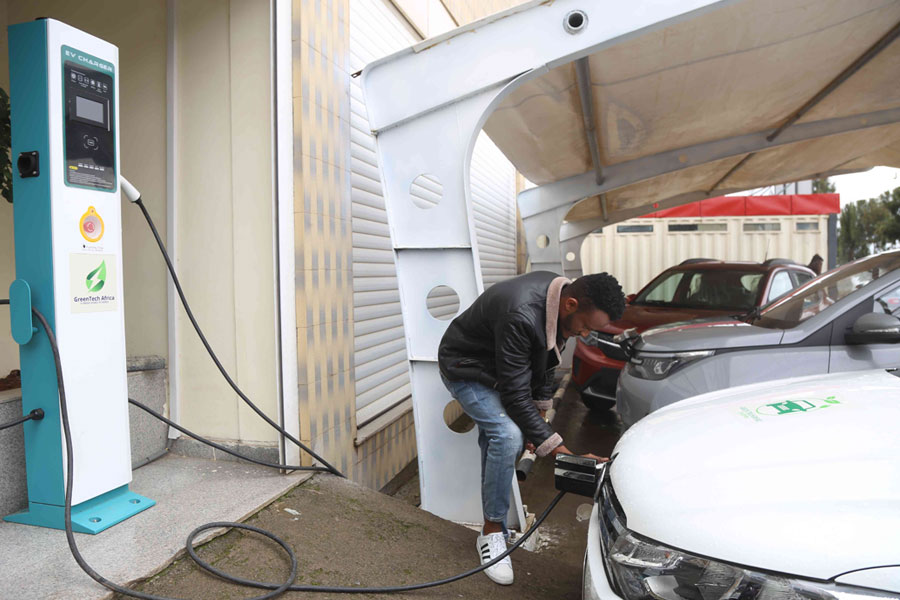
Radar | Dec 19,2018
Transport owners with permits to operate in Addis Abeba will be compelled to keep audited accounts beginning this year, obliged to comply with a new tax regime the authorities imposed on the sector.
The notice from the authorities followed after transport operators were moved from lower to middle bracket taxpayers status last year. Officials at the Addis Abeba Revenues Bureau were expecting the operators to comply with bookkeeping guidelines. To their dismay, however, almost none of the operators did, attributing the complexity of the transport business as an inconvenience to recording transactions.
The operators were penalised, a measure the authorities lifted later on after pressure from the Ethiopian Transport Employers' Federation leaders, representing 54 transport associations with over 9,000 members. The lobby group wrote a letter to the Bureau appealing for the waiver while claiming its members were unaware of the new requirements.
"Transport owners should have been provided with better information about the bookkeeping system before imposing the penalty," said Dejene Luche, public relations officer at the Federation.
The Bureau used a presumptive tax payment regime to collect income tax from transport owners. It considered seating or carrying capacity, annual turnover, and the age of the vehicles in question in determining the tax.
A cross-country bus with a seating capacity of 50 people was required to pay 7,000 Br in annual tax, while freight trucks with a carrying capacity between 151 and 200 quintals were obliged to pay 9,000 Br. This is no longer applicable for all the transport owners but intra-city operators. According to the letter issued to the Federation, the latter are expected to fulfil their tax duties based on the presumptive tax payment regime.
"It'll stay that way until more research is done to fill gaps, particularly with receipt issuing," said Getachew Girma, head of the tax audit directorate at the Bureau.
Other operators will be required to conduct regular bookkeeping beginning this year.
The Bureau mandated transport operators, including cross-country bus services and freight trucks, to begin issuing receipts and keep track of their incomes beginning last year. However, the Federation's leaders claim there was little to no awareness among transport operators about the new regime. Operators allege that it is challenging to keep track of their expenses, especially miscellaneous payments made to conductors and drivers.
According to Aregawi Girmay, manager of the International Cross-Border Transport Association, issuing receipts would not be a problem but keeping track of informal costs, like payments to drivers and assistants for road expenses, could be complicated. This is particularly true for long-distance trips, he said.
"It can be up to 20,000 Br for a single trip," said Aregawi.
It could also be challenging to obtain receipts for buying parts as suppliers conduct informal sales.
Some operators had already settled their fines before the Bureau announced it had forfeited penalties. However, these operators will no be getting refunds, according to officials.
Yohannes Woldegebriel, a legal expert who had served as an attorney for customs authority, contends that revisions have to be made in the equitability of the transport sector before taxation issues can be tackled. The authorities need to work out regulating transport operators, who often overstep legal restrictions to earn more, before focusing on tax, according to Yohannes.
"Some operators work where they shouldn't be working," he said. "Pushing others out of the market, they pay no taxes. It's not fair."
PUBLISHED ON
Jul 31,2021 [ VOL
22 , NO
1109]

Radar | Dec 19,2018

Agenda | Dec 21,2019

Commentaries | Oct 16,2020

Fortune News | May 07,2025

Radar | Sep 27,2025

View From Arada | Oct 26,2024

Fortune News | Apr 26,2019

Featured | Sep 10,2023

Fortune News | Feb 25,2023

Editorial | Sep 19,2020

Dec 22 , 2024 . By TIZITA SHEWAFERAW
Charged with transforming colossal state-owned enterprises into modern and competitiv...

Aug 18 , 2024 . By AKSAH ITALO
Although predictable Yonas Zerihun's job in the ride-hailing service is not immune to...

Jul 28 , 2024 . By TIZITA SHEWAFERAW
Unhabitual, perhaps too many, Samuel Gebreyohannes, 38, used to occasionally enjoy a couple of beers at breakfast. However, he recently swit...

Jul 13 , 2024 . By AKSAH ITALO
Investors who rely on tractors, trucks, and field vehicles for commuting, transporting commodities, and f...

Oct 18 , 2025
The political establishment, notably the ruling party and its top brass, has become p...

Oct 11 , 2025
Ladislas Farago, a roving Associated Press (AP) correspondent, arrived in Ethiopia in...

Oct 4 , 2025
Eyob Tekalegn (PhD) had been in the Governor's chair for only weeks when, on Septembe...

Sep 27 , 2025
Four years into an experiment with “shock therapy” in education, the national moo...